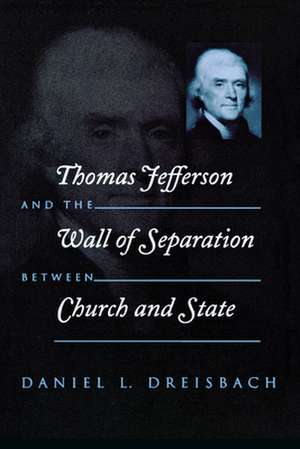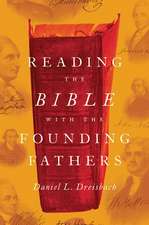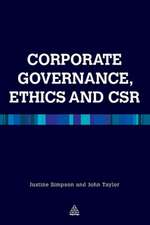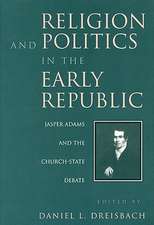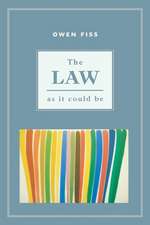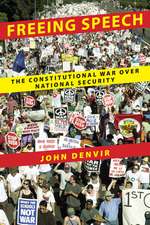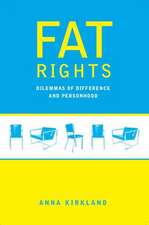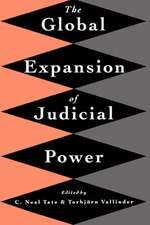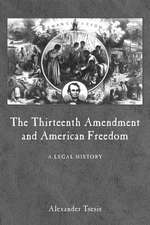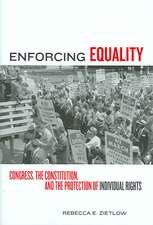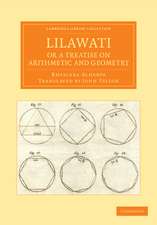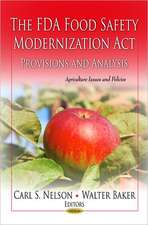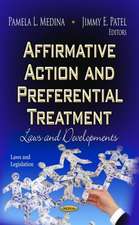Thomas Jefferson and the Wall of Separation Between Church and State
Autor Daniel Dreisbachen Limba Engleză Paperback – 30 sep 2003
| Toate formatele și edițiile | Preț | Express |
|---|---|---|
| Paperback (1) | 241.64 lei 43-57 zile | |
| MI – New York University – 30 sep 2003 | 241.64 lei 43-57 zile | |
| Hardback (1) | 528.07 lei 43-57 zile | |
| MI – New York University – 31 aug 2002 | 528.07 lei 43-57 zile |
Preț: 241.64 lei
Nou
Puncte Express: 362
Preț estimativ în valută:
46.24€ • 48.41$ • 38.26£
46.24€ • 48.41$ • 38.26£
Carte tipărită la comandă
Livrare economică 07-21 aprilie
Preluare comenzi: 021 569.72.76
Specificații
ISBN-13: 9780814719367
ISBN-10: 0814719368
Pagini: 284
Dimensiuni: 152 x 228 x 20 mm
Greutate: 0.41 kg
Editura: MI – New York University
ISBN-10: 0814719368
Pagini: 284
Dimensiuni: 152 x 228 x 20 mm
Greutate: 0.41 kg
Editura: MI – New York University
Recenzii
"Excellent introduction to the thorny interpretive issues that continue to grow around Jefferson's wall."The Journal of Southern History On an evaluative note, the book is helpful for gaining an understanding of the historical context of Jefforsons metaphor.
Journal of Church and State "In the opinion of this reviewer, Dreisbach is undeniably correct. His research is thorough, and his analysis comports with the history of the period. Dreisbach's study of Jefferson's likely meaning when he utilized the phrase "wall of separation" makes a valuable contribution to an important area of the constitutional law, an area of great consequence to Christians. The fact that it is written by a law professor at a "top twenty" law school increases its significance and credibility in the scholar world. The book has a minimum of legal jargon and can easily be understood. Daniel Dreisbach's book is highly recommended."Faith and Mission "Daniel Dreisbach's book is a welcome and much needed addition to the scholarship on the First Amendment. Dreisbach analysis of Jefferson's metaphor, its political context, and consequences for church-state jurisprudence, provide an intellectual perspective as the Court and nation reconsider issues of accomodations of religion in the public square."Journal of Interdisciplinary Studies "The book plausibly argues that scholars have seen too secular a Jefferson."
Perspectives on Political Science "Dreisbach's new book makes an important contribution to church-state scholarship by elaborating both the circumstances surrounding Jefferson's original use of this metaphor and its introduction into modern constitutional discourse."
The Virginia Magazine "This is an excellent, eloquent book about a metaphor on the uses and pitfalls of metaphors in legal discourse, and on the meaning of the very brief words in the First Amendment."
Catholic Historical Review "Dreisbach argues convincingly that federalism constituted a key aspect of Jefferson's reply to the Danbury Baptists."
Journal of the Early Republic " Thomas Jefferson and the Wall of Separation is the product of Dreisbach's solid, extensive research, much of it hidden away in valuable notes. He writes in a direct, clear style, with hints of humor."
The Review of Politics "[A] vigorous critique of separationist dogmas"
Christianity Today "Both the sources themselves, and the extensive notes on the secondary literature make the book a 'must read' for anyone interested in the continued impact of Jefferson's metaphor upon the constitutional and legal interpretations of religion and its role in the contemporary United Sates."
Journal of the American Academy of Religion "Scholars recently have taken a new look at the historical foundations of the Establishment Clause. . . . Thomas Jefferson and the Wall of Separation between Church and State is a valuable contribution to that debate."
Harvard Journal of Law & Public Policy "Dreisbach offers an in-depth study into what Jefferson meant by the 'wall of separation between church and state' and claims that the extent of the wall was to prohibit Congress from establishing a national state church."
Conscience "Dreisbach examines the letter and its historical context and concludes that Jefferson might not agree with the restrictive way the courts today have interpreted his phrase."
Houston Chronicle "Now we know when secularists refer to Jefferson's "wall," they're speaking from ignorance. In short, they are advocating Black's wall
a wall of imprisonment and censorship, not Jefferson's, which was a wall of protection."
Citizen "Excellent . . . Dreisbach makes a persuasive case."
Catalyst "Thomas Jefferson and the Wall of Separation Between Church and State offers an in-depth examination of the origins, controversial uses, and competing interpretations of this powerful metaphor in law and public policy"
American Vision "Daniel L. Driesbach's Thomas Jefferson and the Wall of Separation Between Church and Stateprovides important historical analysis."
World "Daniel Dreisbach, a professor at American University, has now written a valuable history of the "wall of separation" metaphor...[a] superb book."
Claremont Review of Books "[This] book clearly explains that the purpose of the First Amendment's "establishment" clause was to leave the individual states free to decide for themselves how to integrate religion with government."
Chronicles "Dreisbach offers a fascinating and thorough account of Jefferson's understanding of the metaphor...and has provided the legal community with a valuable service in bringing together the documentary evidence for Jefferson's understanding of the "wall of separation," along with careful and transparent commentary on what the evidence means."
The Law and Politics Book Review
"Excellent introduction to the thorny interpretive issues that continue to grow around Jefferson's wall."--The Journal of Southern History " On an evaluative note, the book is helpful for gaining an understanding of the historical context of Jefforson's metaphor." --Journal of Church and State "In the opinion of this reviewer, Dreisbach is undeniably correct. His research is thorough, and his analysis comports with the history of the period. Dreisbach's study of Jefferson's likely meaning when he utilized the phrase "wall of separation" makes a valuable contribution to an important area of the constitutional law, an area of great consequence to Christians. The fact that it is written by a law professor at a "top twenty" law school increases its significance and credibility in the scholar world. The book has a minimum of legal jargon and can easily be understood. Daniel Dreisbach's book is highly recommended."--Faith and Mission "Daniel Dreisbach's book is a welcome and much needed addition to the scholarship on the First Amendment. Dreisbach analysis of Jefferson's metaphor, its political context, and consequences for church-state jurisprudence, provide an intellectual perspective as the Court and nation reconsider issues of accomodations of religion in the public square."--Journal of Interdisciplinary Studies "The book plausibly argues that scholars have seen too secular a Jefferson." -- Perspectives on Political Science "Dreisbach's new book makes an important contribution to church-state scholarship by elaborating both the circumstances surrounding Jefferson's original use of this metaphor and its introduction into modern constitutional discourse." --The Virginia Magazine "This is an excellent, eloquent book about a metaphor on the uses and pitfalls of metaphors in legal discourse, and on the meaning of the very brief words in the First Amendment." --Catholic Historical Review "Dreisbach argues convincingly that federalism constituted a key aspect of Jefferson's reply to the Danbury Baptists." --Journal of the Early Republic " Thomas Jefferson and the Wall of Separation is the product of Dreisbach's solid, extensive research, much of it hidden away in valuable notes. He writes in a direct, clear style, with hints of humor." -- The Review of Politics "[A] vigorous critique of separationist dogmas" --Christianity Today "Both the sources themselves, and the extensive notes on the secondary literature make the book a 'must read' for anyone interested in the continued impact of Jefferson's metaphor upon the constitutional and legal interpretations of religion and its role in the contemporary United Sates." --Journal of the American Academy of Religion "Scholars recently have taken a new look at the historical foundations of the Establishment Clause... Thomas Jefferson and the Wall of Separation between Church and State is a valuable contribution to that debate." --Harvard Journal of Law & Public Policy "Dreisbach offers an in-depth study into what Jefferson meant by the 'wall of separation between church and state' and claims that the extent of the wall was to prohibit Congress from establishing a national state church." --Conscience "Dreisbach examines the letter and its historical context and concludes that Jefferson might not agree with the restrictive way the courts today have interpreted his phrase." --Houston Chronicle "Now we know when secularists refer to Jefferson's "wall," they're speaking from ignorance. In short, they are advocating Black's wall --a wall of imprisonment and censorship, not Jefferson's, which was a wall of protection." --Citizen "Excellent ... Dreisbach makes a persuasive case." --Catalyst "Thomas Jefferson and the Wall of Separation Between Church and State offers an in-depth examination of the origins, controversial uses, and competing interpretations of this powerful metaphor in law and public policy" --American Vision "Daniel L. Driesbach's Thomas Jefferson and the Wall of Separation Between Church and Stateprovides important historical analysis." --World "Daniel Dreisbach, a professor at American University, has now written a valuable history of the "wall of separation" metaphor...[a] superb book." --Claremont Review of Books "[This] book clearly explains that the purpose of the First Amendment's "establishment" clause was to leave the individual states free to decide for themselves how to integrate religion with government." --Chronicles "Dreisbach offers a fascinating and thorough account of Jefferson's understanding of the metaphor...and has provided the legal community with a valuable service in bringing together the documentary evidence for Jefferson's understanding of the "wall of separation," along with careful and transparent commentary on what the evidence means." --The Law and Politics Book Review
Journal of Church and State "In the opinion of this reviewer, Dreisbach is undeniably correct. His research is thorough, and his analysis comports with the history of the period. Dreisbach's study of Jefferson's likely meaning when he utilized the phrase "wall of separation" makes a valuable contribution to an important area of the constitutional law, an area of great consequence to Christians. The fact that it is written by a law professor at a "top twenty" law school increases its significance and credibility in the scholar world. The book has a minimum of legal jargon and can easily be understood. Daniel Dreisbach's book is highly recommended."Faith and Mission "Daniel Dreisbach's book is a welcome and much needed addition to the scholarship on the First Amendment. Dreisbach analysis of Jefferson's metaphor, its political context, and consequences for church-state jurisprudence, provide an intellectual perspective as the Court and nation reconsider issues of accomodations of religion in the public square."Journal of Interdisciplinary Studies "The book plausibly argues that scholars have seen too secular a Jefferson."
Perspectives on Political Science "Dreisbach's new book makes an important contribution to church-state scholarship by elaborating both the circumstances surrounding Jefferson's original use of this metaphor and its introduction into modern constitutional discourse."
The Virginia Magazine "This is an excellent, eloquent book about a metaphor on the uses and pitfalls of metaphors in legal discourse, and on the meaning of the very brief words in the First Amendment."
Catholic Historical Review "Dreisbach argues convincingly that federalism constituted a key aspect of Jefferson's reply to the Danbury Baptists."
Journal of the Early Republic " Thomas Jefferson and the Wall of Separation is the product of Dreisbach's solid, extensive research, much of it hidden away in valuable notes. He writes in a direct, clear style, with hints of humor."
The Review of Politics "[A] vigorous critique of separationist dogmas"
Christianity Today "Both the sources themselves, and the extensive notes on the secondary literature make the book a 'must read' for anyone interested in the continued impact of Jefferson's metaphor upon the constitutional and legal interpretations of religion and its role in the contemporary United Sates."
Journal of the American Academy of Religion "Scholars recently have taken a new look at the historical foundations of the Establishment Clause. . . . Thomas Jefferson and the Wall of Separation between Church and State is a valuable contribution to that debate."
Harvard Journal of Law & Public Policy "Dreisbach offers an in-depth study into what Jefferson meant by the 'wall of separation between church and state' and claims that the extent of the wall was to prohibit Congress from establishing a national state church."
Conscience "Dreisbach examines the letter and its historical context and concludes that Jefferson might not agree with the restrictive way the courts today have interpreted his phrase."
Houston Chronicle "Now we know when secularists refer to Jefferson's "wall," they're speaking from ignorance. In short, they are advocating Black's wall
a wall of imprisonment and censorship, not Jefferson's, which was a wall of protection."
Citizen "Excellent . . . Dreisbach makes a persuasive case."
Catalyst "Thomas Jefferson and the Wall of Separation Between Church and State offers an in-depth examination of the origins, controversial uses, and competing interpretations of this powerful metaphor in law and public policy"
American Vision "Daniel L. Driesbach's Thomas Jefferson and the Wall of Separation Between Church and Stateprovides important historical analysis."
World "Daniel Dreisbach, a professor at American University, has now written a valuable history of the "wall of separation" metaphor...[a] superb book."
Claremont Review of Books "[This] book clearly explains that the purpose of the First Amendment's "establishment" clause was to leave the individual states free to decide for themselves how to integrate religion with government."
Chronicles "Dreisbach offers a fascinating and thorough account of Jefferson's understanding of the metaphor...and has provided the legal community with a valuable service in bringing together the documentary evidence for Jefferson's understanding of the "wall of separation," along with careful and transparent commentary on what the evidence means."
The Law and Politics Book Review
"Excellent introduction to the thorny interpretive issues that continue to grow around Jefferson's wall."--The Journal of Southern History " On an evaluative note, the book is helpful for gaining an understanding of the historical context of Jefforson's metaphor." --Journal of Church and State "In the opinion of this reviewer, Dreisbach is undeniably correct. His research is thorough, and his analysis comports with the history of the period. Dreisbach's study of Jefferson's likely meaning when he utilized the phrase "wall of separation" makes a valuable contribution to an important area of the constitutional law, an area of great consequence to Christians. The fact that it is written by a law professor at a "top twenty" law school increases its significance and credibility in the scholar world. The book has a minimum of legal jargon and can easily be understood. Daniel Dreisbach's book is highly recommended."--Faith and Mission "Daniel Dreisbach's book is a welcome and much needed addition to the scholarship on the First Amendment. Dreisbach analysis of Jefferson's metaphor, its political context, and consequences for church-state jurisprudence, provide an intellectual perspective as the Court and nation reconsider issues of accomodations of religion in the public square."--Journal of Interdisciplinary Studies "The book plausibly argues that scholars have seen too secular a Jefferson." -- Perspectives on Political Science "Dreisbach's new book makes an important contribution to church-state scholarship by elaborating both the circumstances surrounding Jefferson's original use of this metaphor and its introduction into modern constitutional discourse." --The Virginia Magazine "This is an excellent, eloquent book about a metaphor on the uses and pitfalls of metaphors in legal discourse, and on the meaning of the very brief words in the First Amendment." --Catholic Historical Review "Dreisbach argues convincingly that federalism constituted a key aspect of Jefferson's reply to the Danbury Baptists." --Journal of the Early Republic " Thomas Jefferson and the Wall of Separation is the product of Dreisbach's solid, extensive research, much of it hidden away in valuable notes. He writes in a direct, clear style, with hints of humor." -- The Review of Politics "[A] vigorous critique of separationist dogmas" --Christianity Today "Both the sources themselves, and the extensive notes on the secondary literature make the book a 'must read' for anyone interested in the continued impact of Jefferson's metaphor upon the constitutional and legal interpretations of religion and its role in the contemporary United Sates." --Journal of the American Academy of Religion "Scholars recently have taken a new look at the historical foundations of the Establishment Clause... Thomas Jefferson and the Wall of Separation between Church and State is a valuable contribution to that debate." --Harvard Journal of Law & Public Policy "Dreisbach offers an in-depth study into what Jefferson meant by the 'wall of separation between church and state' and claims that the extent of the wall was to prohibit Congress from establishing a national state church." --Conscience "Dreisbach examines the letter and its historical context and concludes that Jefferson might not agree with the restrictive way the courts today have interpreted his phrase." --Houston Chronicle "Now we know when secularists refer to Jefferson's "wall," they're speaking from ignorance. In short, they are advocating Black's wall --a wall of imprisonment and censorship, not Jefferson's, which was a wall of protection." --Citizen "Excellent ... Dreisbach makes a persuasive case." --Catalyst "Thomas Jefferson and the Wall of Separation Between Church and State offers an in-depth examination of the origins, controversial uses, and competing interpretations of this powerful metaphor in law and public policy" --American Vision "Daniel L. Driesbach's Thomas Jefferson and the Wall of Separation Between Church and Stateprovides important historical analysis." --World "Daniel Dreisbach, a professor at American University, has now written a valuable history of the "wall of separation" metaphor...[a] superb book." --Claremont Review of Books "[This] book clearly explains that the purpose of the First Amendment's "establishment" clause was to leave the individual states free to decide for themselves how to integrate religion with government." --Chronicles "Dreisbach offers a fascinating and thorough account of Jefferson's understanding of the metaphor...and has provided the legal community with a valuable service in bringing together the documentary evidence for Jefferson's understanding of the "wall of separation," along with careful and transparent commentary on what the evidence means." --The Law and Politics Book Review
Notă biografică
Daniel Dreisbach
